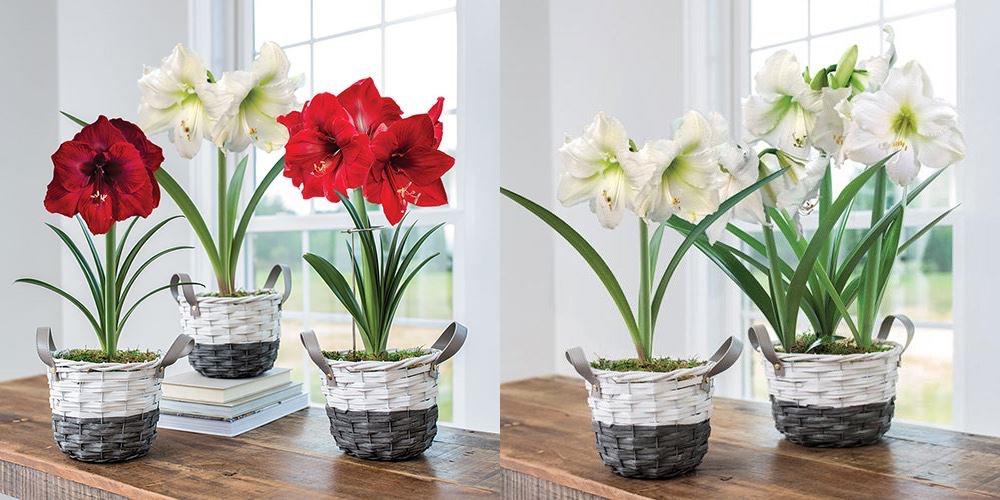There are certain plants that are iconic when it comes to the winter holidays: mistletoe, poinsettia, holly, evergreens of all kinds, to name a few. Perhaps the most showy of them all, and one that we usually only see during this time of year, is the glorious amaryllis. From the Farmer’s Almanac comes easy growing instructions so that you too can cultivate these beautiful blooms in your own home.
Amaryllises are beautiful Christmas bulbs that are easy to care for. Find out how to buy the best amaryllis bulbs, how to plant them, care for them, and how to make sure they bloom again next winter!
No one gets more excited about amaryllis than a first-time grower. These big bulbs are easy to bring into bloom, and even a novice can expect success.
Buying Amaryllis: Types of Bulbs
When shopping for amaryllis bulbs, you can buy the boxed kits which contain not only a fat bulb but a pot and some soil. These make a nice gift, but there are not a lot of color choices—generally they offer red, pink, and white. Some garden centers offer large-size, bare bulbs which give you more variety, and each one usually produces 2 or more flower spikes. Each spike will produce 2 to 4 large trumpet-shaped blossoms.
Amaryllis bulbs are classified by size, which is determined by measuring around the outside of the bulb at its widest point.
Another good reason for choosing a bare bulb is that you can see the condition of the bulb without having to rummage around in a box. Make sure it is heavy and firm, not moldy or squishy. It should have some fairly long fleshy roots attached.
How to Plant Amaryllis Bulbs
If you can’t pot it up right away, store it in a cool, dry, dark place.
Before planting, soak the roots in lukewarm water for a few hours to re-hydrate them. Amaryllis like to be slightly pot-bound. The pot needs to be only 2 inches wider than the bulb so that when it is planted there is only an inch of soil between the bulb and the edge of the pot. Put a layer of soil in the bottom of the pot and position the bulb so the top sticks up above the rim of the pot. Firm the soil around the edge, leaving the top third of the bulb exposed. If planted too deeply it will rot. Water sparingly at first, allowing the soil to dry out between watering.
How to Care for Amaryllis
Place in a warm spot until the first green shoot appears, then it can be moved to a bright sunny location. Rotate the pot a quarter turn each time you water to keep the spike from leaning toward the light. Stake it if necessary to keep it from snapping—these plants tend to be top heavy. Putting the pot into a larger, heavier cache pot will not only keep it from toppling, but will also balance the look of the large flowers. Once your amaryllis is blooming, you can move it to a cooler location out of direct sunlight to make the blossoms last longer.
How to Care for Amaryllis After Flowering
One of the most frequently asked questions after the holidays is, “Now that my amaryllis has finished flowering, how can I get it to bloom again?” Those big bulbs can take center stage again next Christmas if given proper care.
After blossoming, the bulb needs to grow and store food for next season’s bloom. Often the bulbs actually shrink in size from the stress of blooming and need to recover lost nutrients.
Once the blossoms have faded, cut off the flower stalk, but keep the leaves growing by placing the pot in a warm, sunny spot. Water regularly and fertilize weekly with a balanced houseplant fertilizer. This allows next year’s buds to form within the bulb.
It takes a minimum of four leaves to produce one flower stalk, because the buds form in the axils of every fourth bulb scale. Keep the plant growing all summer long; you can even move it outside for the summer. Bring it in at the end of August and let it dry out to induce a period of dormancy. Put the pot in a cool (around 50 degrees) dark place. Pull off any dried up leaves.
To induce flowering in time for Christmas, bring the plant into a warm, sunny location and resume watering around November 1st. If you wish to rejuvenate the soil around your bulb, repot it at this time or just scrape off the top 2 inches or so of loose soil and replace it with fresh soil. In about 4-6 weeks it should be in full bloom.
Street Address
City, State, Zip
Phone Number
unlocking your child's potential
Your Custom Text Here

